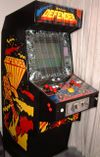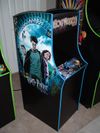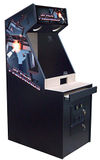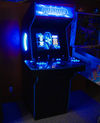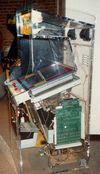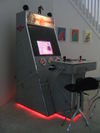Difference between revisions of "Overview & Options to Consider"
m (→Physical design) |
m (56 revisions) |
||
| (16 intermediate revisions by 3 users not shown) | |||
| Line 1: | Line 1: | ||
| − | Adding graphics to your cabinet can transform it from an oversized PC case into a | + | Adding graphics to your cabinet can transform it from an oversized PC case into a classic machine that looks like it came straight out of a real arcade. It is the final touches that can make or break a great cabinet. The right choice of artwork and details can make a generic cabinet look simply amazing, while poorly done artwork options can make the most inventive cabinet design look dull. Although it is easy to overlook this area of cabinet building, it should be considered a crucial final step in creating your personal piece of arcade history. |
There are generally 5 main approaches to designing the look of your cabinet that you may want to consider early in the planning phase of your cabinet. Each has drawbacks, and each requires varying degrees of skill to execute. Find detailed descriptions below. | There are generally 5 main approaches to designing the look of your cabinet that you may want to consider early in the planning phase of your cabinet. Each has drawbacks, and each requires varying degrees of skill to execute. Find detailed descriptions below. | ||
More information to come; | More information to come; | ||
| − | + | =Restoration graphics= | |
| − | One of the most | + | One of the most straightforward methods of adding some pizzaz to your cabinet is to use reproduction (repro) artwork based on your favorite game. There are many distinctive cabinets that have been released over the years: Pac-Man, Galaga, Galaxian etc (all of the Williams cabinets!) and a lot of the artwork is still reproduced by reputable dealers and readily available. If you choose to use repro art there are a few things you need to consider: |
| − | #''' | + | #'''Cost of reproduction graphics:''' Bezels, marquees and control panel overlays (CPOs)are usually fairly inexpensive and easily obtainable with prices in the $10-$50 range. Side art is usually more expensive, running from $50-$300 for a complete set. |
| − | #''' | + | #'''Availability of repro artwork:''' If your favorite game is Ms. Pac Man you will find the art readily available for sale through an online dealer, at an auction or on eBay for a reasonable price. If however your favorite game happened to be [http://www.macmame.net/klov/defnder3.html Defender 3] chances are you are not going to easily find repro or new old stock (NOS) to use on your cab. If you are trying to restore a cabinet to its authentic former glory it may be worth waiting to find something to complete your masterpiece. If you are not restoring, just pick something else cool...at least that way your cabinet will look good while you're trying to find the rare stuff. |
| − | #''' | + | #'''Accuracy of available reproduction artwork:''' While most reproduction houses have high quality artwork available, you may want to investigate the quality & reputation a little bit before you lay down your hard earned cash. Ask questions about the vendor & about the specific piece of repro art at places like [http://groups.google.com/group/rec.games.video.arcade.collecting?lnk=lr&hl=en RGVAC] or in the [http://forum.arcadecontrols.com/index.php/board,13.0.html artwork section of BYOAC.] In my past experience of dealing with repro art I have occasionally been dissatisfied with the material thickness, detail, and color of various pieces from various vendors. In many instances you will have a tough time getting your money back, so it's best to ask your questions first. If you really know what you want, you may find that repro art does not accurately capture proper color, appliqué (foil, embossing) detail, material (smooth, rough, textured,) thickness, strength, or opacity (in the case of marquees or bezels.) Many repro dealers and repro artwork sites may not have access to pristine NOS art to sample when they create repros and their printing method may not capture the original color (like Pac Man yellow) so you may have to settle for "pretty good" in some cases unless you are looking for absolute restoration style accuracy. In that case, buy NOS if you can find it. |
| − | #''' | + | #'''Ease of application:''' In most cases adding artwork should be fairly simple for the average person. Most of it involves the use of adhesives and patience. Many Williams machines use stenciled paint for side and front art and accurate reproduction requires some skill, equipment and practice. If you don't have the patience to spend days doing the necessary preparation and execution required to paint with stencils, you may want to purchase repro stickers instead. If you have absolutely zero patience, you may want to avoid buying large pieces of full side-art stickers (like Centipede) as well. Applying very large stickers requires some skill to reduce bubbles and wrinkles when applying the art. Marquees, correctly sized bezels and CPOs are fairly easy to apply and the average person should not have a problem. |
| − | + | =Resto-mod graphics= | |
{| align=right | {| align=right | ||
| valign="top"| | | valign="top"| | ||
| Line 19: | Line 19: | ||
|[[image:defmod.jpg|thumb|100px|Defender Control Panel modded for more controls]] | |[[image:defmod.jpg|thumb|100px|Defender Control Panel modded for more controls]] | ||
|} | |} | ||
| − | Resto-mod is basically anything that is based on a classic design | + | Resto-mod is basically anything that is based on a classic design but does not fully reproduce the original design. There are a few reasons to choose the resto-mod route; |
| − | #'''Cost''' It's cheaper to just put a Defender marquee and control panel on your cabinet than it is to add bezel, side and front art as well. A marquee and CPO might cost a total of $70, while the full kit might cost $200 to $300. | + | #'''Cost:''' It's cheaper to just put a Defender marquee and control panel on your cabinet than it is to add bezel, side and front art as well. A marquee and CPO might cost a total of $70, while the full kit might cost $200 to $300. |
| − | #'''Personal touches''' "Dee Fender, | + | #'''Personal touches:''' "Dee Fender", "LeeVious" and "Jim's Pac Man" marquee titles are all examples taken from real arcade cabinets that people have built. Each displays a little of the personality (and the artistic judgement) of the owner. |
| − | #'''Making a statement''' Many people want their machine to be seen as more than a just a box for | + | #'''Making a statement:''' Many people want their machine to be seen as more than a just a box for one game. Defendercade, Pacmamea and Hyper-Galaxian are all examples of this. Each marquee title implies that the cabinet is more than just a simple arcade classic. |
| − | #'''Physical differences''' Different sizes of cabinets | + | #'''Physical differences:''' Different sizes and shapes of cabinets and different configurations of controls on the control panel are a few reasons that physical differences may require you to modify the art of a classic design. For instance, if you love the art from Galaga but have a generic Dynamo cab, you might have to alter the art a little bit to fit the different cabinet shape. If you are building a Defender shaped cabinet but want to use a trackball and spinner in addition to the standard Defender buttons, you will have to make a few changes to the original defender CPO design. |
Resto-mod can be a great shortcut to making a cool cabinet, without some of the cost and complexity involved in fully reproducing the original design. If you aren't careful though, your cabinet can also end up looking cheap and boring, with the art obviously a silly afterthought. Slapping a Galaxian marquee on your cabinet won't in itself make your box look great. A well thought out theme based on a classic design, however, can have some striking results. Great resto-mod designs capture the spirit of the original theme blending the changes perfectly with original art, while adding a dimension of uniqueness, rather than looking like pale imitators. | Resto-mod can be a great shortcut to making a cool cabinet, without some of the cost and complexity involved in fully reproducing the original design. If you aren't careful though, your cabinet can also end up looking cheap and boring, with the art obviously a silly afterthought. Slapping a Galaxian marquee on your cabinet won't in itself make your box look great. A well thought out theme based on a classic design, however, can have some striking results. Great resto-mod designs capture the spirit of the original theme blending the changes perfectly with original art, while adding a dimension of uniqueness, rather than looking like pale imitators. | ||
| − | + | =Original theme graphics= | |
{| align=right | {| align=right | ||
| valign="top"| | | valign="top"| | ||
| Line 50: | Line 50: | ||
If you'd like a few suggestions on design, head over to the [[Creating Your Own Art From Scratch]] page. | If you'd like a few suggestions on design, head over to the [[Creating Your Own Art From Scratch]] page. | ||
| − | + | =Physical design= | |
If you are more into tools & gadgets than you are into graphics & design programs, you may be more interested in building a cabinet that derives its visual interest from the materials and objects incorporated into it. The options are endless, its just up to you and your imagination. Metals, neon, chrome, velure, lexan, and varnished wood, cardboard, have all been used as materials for cabinet building by clever enthusiasts. How far can you push your design? Take a look at some of the examples for inspiration. | If you are more into tools & gadgets than you are into graphics & design programs, you may be more interested in building a cabinet that derives its visual interest from the materials and objects incorporated into it. The options are endless, its just up to you and your imagination. Metals, neon, chrome, velure, lexan, and varnished wood, cardboard, have all been used as materials for cabinet building by clever enthusiasts. How far can you push your design? Take a look at some of the examples for inspiration. | ||
| Line 64: | Line 64: | ||
|} | |} | ||
| − | ==Hodge Podge== | + | =Hodge Podge= |
| − | + | Hodge Podge is a nice way of describing cabinet art that has had little planning, and little in the way of effort at applying any art. If you hodge podge the art, you will find that the results rarely turn out to make a powerful statement. If you really have little time to think about the art, it may be best to simply paint the cabinet, and maybe add some colored t-molding to add a little pop. | |
| + | |||
| + | How you design your art is a matter of taste, that's true. Regardless of your particular taste, you should make a plan before you begin applying art. All of the techniques I mention below '''can''' be part of a well done cabinet. The techniques used in a hodge-podge cabinet aren't the real problem. Lack of thought will be the true failure. | ||
| + | |||
| + | You can always redo your cabinet, so feel free to try things out, experiment, cut corners if you're trying to save money. Be honest with yourself when you are done though. Solicit the input of friends and family to see what they think, evaluate the quality of the finished product. If others dislike your cabinet but you like the look of it, then defend your decisions as a matter of taste. If you agree with them, consider planning a new design, and be prepared to take some time with the execution. | ||
| + | |||
| + | It's understandeable that you may want to immediately get to playing your games rather than working on the art. If that's truly the case it's probably best to do next to nothing with the art at all, rather than scraping together whatever you have handy to adorn your cabinet as cheaply and quickly as possible. Examples of this style involve a combination of mismatched colors, mixed themes, decoupage using cutouts from magazines or images printed from a printer and pasted or laquered onto a cabinet, contact paper or wallpaper, or movie posters adhered to the cabinet. Poor use of materials is also a hallmark of a poorly done cabinet, the appearance of extra glue, poorly made cuts with scissors, marred stickers or paper, irregular lines, hand written type will reduce the overal greatness of your otherwise worthy cabinet. This may sound laughable, but it is fairly common. If you are going to the trouble of building a cabinet from scratch, or buying hundreds of dollars in parts to restore a cabinet, the finished product should look professional. Don't let the art be the weak link. | ||
| + | |||
| + | [http://forum.arcadecontrols.com/index.php/board,13.0.html The BYOAC Artwork Pages] are a great place to ask questions about design programs, general design, production issues, vendors, and to request a critique of your artwork. A few suggestions by interested invividuals may go a long way to helping you improve on your themed artwork. Don't hesitate to ask for help, it's encouraged. | ||
| + | |||
| + | ==See Also== | ||
| + | * [[Finishing]] | ||
| + | * [[Vendors|Artwork Vendors]] | ||
| + | |||
| + | [[Category:Finishing]] | ||
Latest revision as of 08:49, 5 December 2013
Adding graphics to your cabinet can transform it from an oversized PC case into a classic machine that looks like it came straight out of a real arcade. It is the final touches that can make or break a great cabinet. The right choice of artwork and details can make a generic cabinet look simply amazing, while poorly done artwork options can make the most inventive cabinet design look dull. Although it is easy to overlook this area of cabinet building, it should be considered a crucial final step in creating your personal piece of arcade history.
There are generally 5 main approaches to designing the look of your cabinet that you may want to consider early in the planning phase of your cabinet. Each has drawbacks, and each requires varying degrees of skill to execute. Find detailed descriptions below.
More information to come;
Contents
Restoration graphics
One of the most straightforward methods of adding some pizzaz to your cabinet is to use reproduction (repro) artwork based on your favorite game. There are many distinctive cabinets that have been released over the years: Pac-Man, Galaga, Galaxian etc (all of the Williams cabinets!) and a lot of the artwork is still reproduced by reputable dealers and readily available. If you choose to use repro art there are a few things you need to consider:
- Cost of reproduction graphics: Bezels, marquees and control panel overlays (CPOs)are usually fairly inexpensive and easily obtainable with prices in the $10-$50 range. Side art is usually more expensive, running from $50-$300 for a complete set.
- Availability of repro artwork: If your favorite game is Ms. Pac Man you will find the art readily available for sale through an online dealer, at an auction or on eBay for a reasonable price. If however your favorite game happened to be Defender 3 chances are you are not going to easily find repro or new old stock (NOS) to use on your cab. If you are trying to restore a cabinet to its authentic former glory it may be worth waiting to find something to complete your masterpiece. If you are not restoring, just pick something else cool...at least that way your cabinet will look good while you're trying to find the rare stuff.
- Accuracy of available reproduction artwork: While most reproduction houses have high quality artwork available, you may want to investigate the quality & reputation a little bit before you lay down your hard earned cash. Ask questions about the vendor & about the specific piece of repro art at places like RGVAC or in the artwork section of BYOAC. In my past experience of dealing with repro art I have occasionally been dissatisfied with the material thickness, detail, and color of various pieces from various vendors. In many instances you will have a tough time getting your money back, so it's best to ask your questions first. If you really know what you want, you may find that repro art does not accurately capture proper color, appliqué (foil, embossing) detail, material (smooth, rough, textured,) thickness, strength, or opacity (in the case of marquees or bezels.) Many repro dealers and repro artwork sites may not have access to pristine NOS art to sample when they create repros and their printing method may not capture the original color (like Pac Man yellow) so you may have to settle for "pretty good" in some cases unless you are looking for absolute restoration style accuracy. In that case, buy NOS if you can find it.
- Ease of application: In most cases adding artwork should be fairly simple for the average person. Most of it involves the use of adhesives and patience. Many Williams machines use stenciled paint for side and front art and accurate reproduction requires some skill, equipment and practice. If you don't have the patience to spend days doing the necessary preparation and execution required to paint with stencils, you may want to purchase repro stickers instead. If you have absolutely zero patience, you may want to avoid buying large pieces of full side-art stickers (like Centipede) as well. Applying very large stickers requires some skill to reduce bubbles and wrinkles when applying the art. Marquees, correctly sized bezels and CPOs are fairly easy to apply and the average person should not have a problem.
Resto-mod graphics
Resto-mod is basically anything that is based on a classic design but does not fully reproduce the original design. There are a few reasons to choose the resto-mod route;
- Cost: It's cheaper to just put a Defender marquee and control panel on your cabinet than it is to add bezel, side and front art as well. A marquee and CPO might cost a total of $70, while the full kit might cost $200 to $300.
- Personal touches: "Dee Fender", "LeeVious" and "Jim's Pac Man" marquee titles are all examples taken from real arcade cabinets that people have built. Each displays a little of the personality (and the artistic judgement) of the owner.
- Making a statement: Many people want their machine to be seen as more than a just a box for one game. Defendercade, Pacmamea and Hyper-Galaxian are all examples of this. Each marquee title implies that the cabinet is more than just a simple arcade classic.
- Physical differences: Different sizes and shapes of cabinets and different configurations of controls on the control panel are a few reasons that physical differences may require you to modify the art of a classic design. For instance, if you love the art from Galaga but have a generic Dynamo cab, you might have to alter the art a little bit to fit the different cabinet shape. If you are building a Defender shaped cabinet but want to use a trackball and spinner in addition to the standard Defender buttons, you will have to make a few changes to the original defender CPO design.
Resto-mod can be a great shortcut to making a cool cabinet, without some of the cost and complexity involved in fully reproducing the original design. If you aren't careful though, your cabinet can also end up looking cheap and boring, with the art obviously a silly afterthought. Slapping a Galaxian marquee on your cabinet won't in itself make your box look great. A well thought out theme based on a classic design, however, can have some striking results. Great resto-mod designs capture the spirit of the original theme blending the changes perfectly with original art, while adding a dimension of uniqueness, rather than looking like pale imitators.
Original theme graphics
The most creative and striking cabinets that you'll find are well done original themed cabinets. Executing the creation and design of your own personal themed cabinet can be one of the most difficult methods of adding artwork to your cabinet. The payoffs are huge however, you'll have a great looking cab, a certified point of interest in your game room, and infinite hit points. Creating your own art can be a costly, time consuming and technically difficult option, so you may wan to consider the following before you begin your theme;
- Will your theme look good in five years? You don't want to get stuck with a cabinet that's as painful to look at as a faster pussycat tattoo.
- If your theme is going to be based on pop culture stuff (like sports teams, movies, or cartoons) can you find enough high resolution artwork to cover a marquee, control panel and side art?
- If you have a completely original theme, do you realistically have the time and skill to create artwork from scratch?
- Do you have the correct design applications to create your art?
- If you are creating side art, you may want to shop around the cost of printing full size side art before you begin. It may be expensive, or even impossible to get art printed large enough to fit your full sized cabinet. You may have to make some sacrifices.
- If your concept is awesome, would it be worth a few hundred $$$ to pay somebody to create it for you? You might even find a friend or an art student to give you a little help for free.
It's easy for a custom theme to become an unnattractive hodge podge if you're not careful. Planning is key. Choose your theme and do your best to stick to your theme with each piece that you create. If you get tired of the theme while doing a specific piece, don't change gears... it's probably best to abandon the entire theme if you're already sick of it. Just because you have a cool marquee design, but can't think of anything else for the sides or CPO doesn't mean you should go ahead and have the marquee printed. It might be better to choose something else. Before you start your theme, create a budget for each piece you would like to create (cost of a custom CPO, marquee, side art) add at least 15-20% on top of that cost to cover shipping, and any tools and miscellaneous parts for attaching and hacking... make sure you'll have enough dough to complete the full theme. You should price out different options with different printers. If you can't get a quote, chances are that what you're looking for is either inaccessible or prohibitevely expensie. Ask questions about the materials and printing techniques if you have any questions. You want to ensure that your art will look good, and last through lots of abuse. If you have guests... it WILL get some abuse. If you have enough cash and the perfect theme, then it's time to begin the design.
If you'd like a few suggestions on design, head over to the Creating Your Own Art From Scratch page.
Physical design
If you are more into tools & gadgets than you are into graphics & design programs, you may be more interested in building a cabinet that derives its visual interest from the materials and objects incorporated into it. The options are endless, its just up to you and your imagination. Metals, neon, chrome, velure, lexan, and varnished wood, cardboard, have all been used as materials for cabinet building by clever enthusiasts. How far can you push your design? Take a look at some of the examples for inspiration.
Hodge Podge
Hodge Podge is a nice way of describing cabinet art that has had little planning, and little in the way of effort at applying any art. If you hodge podge the art, you will find that the results rarely turn out to make a powerful statement. If you really have little time to think about the art, it may be best to simply paint the cabinet, and maybe add some colored t-molding to add a little pop.
How you design your art is a matter of taste, that's true. Regardless of your particular taste, you should make a plan before you begin applying art. All of the techniques I mention below can be part of a well done cabinet. The techniques used in a hodge-podge cabinet aren't the real problem. Lack of thought will be the true failure.
You can always redo your cabinet, so feel free to try things out, experiment, cut corners if you're trying to save money. Be honest with yourself when you are done though. Solicit the input of friends and family to see what they think, evaluate the quality of the finished product. If others dislike your cabinet but you like the look of it, then defend your decisions as a matter of taste. If you agree with them, consider planning a new design, and be prepared to take some time with the execution.
It's understandeable that you may want to immediately get to playing your games rather than working on the art. If that's truly the case it's probably best to do next to nothing with the art at all, rather than scraping together whatever you have handy to adorn your cabinet as cheaply and quickly as possible. Examples of this style involve a combination of mismatched colors, mixed themes, decoupage using cutouts from magazines or images printed from a printer and pasted or laquered onto a cabinet, contact paper or wallpaper, or movie posters adhered to the cabinet. Poor use of materials is also a hallmark of a poorly done cabinet, the appearance of extra glue, poorly made cuts with scissors, marred stickers or paper, irregular lines, hand written type will reduce the overal greatness of your otherwise worthy cabinet. This may sound laughable, but it is fairly common. If you are going to the trouble of building a cabinet from scratch, or buying hundreds of dollars in parts to restore a cabinet, the finished product should look professional. Don't let the art be the weak link.
The BYOAC Artwork Pages are a great place to ask questions about design programs, general design, production issues, vendors, and to request a critique of your artwork. A few suggestions by interested invividuals may go a long way to helping you improve on your themed artwork. Don't hesitate to ask for help, it's encouraged.
